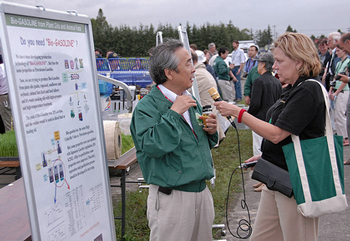Rising gas prices have made headlines this year, but those prices could have been much worse if not for ethanol.
 The Renewable Fuels Association sent out a media FYI release drawing attention to that fact, which is backed up by recent news reports. Specifically, RFA cites stories in the Wall Street Journal and the Dallas Morning News.
The Renewable Fuels Association sent out a media FYI release drawing attention to that fact, which is backed up by recent news reports. Specifically, RFA cites stories in the Wall Street Journal and the Dallas Morning News.
As a September 21, 2007 story in The Wall Street Journal put it,
Another reason for steady gasoline prices: the use of ethanol as an additive to gasoline is on the rise. While crude prices have soared, ethanol prices have dropped as much as 30% in recent months and are likely to drop more, Eitan Bernstein, an analyst with Friedman, Billings, Ramsey & Co., said in a report yesterday. Ethanol costs more than 60 cents a gallon less than gasoline, and gasoline suppliers can offset some of the rise in crude oil prices by blending their gasoline with small amounts of the cheaper fuel.
Similarly, a story in the September 24, 2007 edition of The Dallas Morning News reported:
Peyton Feltus, president of Randolph Risk Management, thinks gasoline prices might even increase this year.
He said ethanol and bio diesel helped keep fuel prices stable since the summer. Blending ethanol into the fuel supply may have boosted pump prices in the past, but now, ethanol is cheaper than gasoline, and it’s keeping overall prices down.
“You can thank renewables for doing that,” Mr. Feltus said.


 Back in 2003, the European Union instituted some major reforms in its agricultural sector, which are now known as the “Fischler Reforms” after the Commissioner for Agriculture, Rural Development and Fisheries at the time,
Back in 2003, the European Union instituted some major reforms in its agricultural sector, which are now known as the “Fischler Reforms” after the Commissioner for Agriculture, Rural Development and Fisheries at the time, 
 Researchers at
Researchers at  In a town most famous for peanuts and a president, biodiesel could be the next chapter for Plains, Georgia.
In a town most famous for peanuts and a president, biodiesel could be the next chapter for Plains, Georgia.  Smiling Earth Energy has offered the money to help the Chesapeake, Virginia neighborhood of South Hill, which has been cut off from the rest of the city since Interstate 464 bisected the area in 1987.
Smiling Earth Energy has offered the money to help the Chesapeake, Virginia neighborhood of South Hill, which has been cut off from the rest of the city since Interstate 464 bisected the area in 1987.  Chrysler is encouraging its customers to buy its new line of diesel vehicles… and then run those vehicles on renewable biodiesel.
Chrysler is encouraging its customers to buy its new line of diesel vehicles… and then run those vehicles on renewable biodiesel. And
And  “We are very pleased to see the level of commitment that Chrysler has put into supporting the use of biodiesel,” said Joe Jobe, NBB CEO. “Chrysler’s incentive program is an attractive benefit for our NBB members, and a great opportunity to buy a new vehicle from a company that is working hard to provide consumers with more ‘green vehicle’ options running on renewable fuel.”
“We are very pleased to see the level of commitment that Chrysler has put into supporting the use of biodiesel,” said Joe Jobe, NBB CEO. “Chrysler’s incentive program is an attractive benefit for our NBB members, and a great opportunity to buy a new vehicle from a company that is working hard to provide consumers with more ‘green vehicle’ options running on renewable fuel.” The latest addition to Jay Leno’s Burbank, CA car garage is a high-class, hydrogen-powered ride. The Beamer fits well with Leno’s environmentally-conscious garage.
The latest addition to Jay Leno’s Burbank, CA car garage is a high-class, hydrogen-powered ride. The Beamer fits well with Leno’s environmentally-conscious garage. Sano Shimoda of BioScience Securities Inc. in Venice, Calif., said at the first Renewable on Parade conference that investors who put their money into ethanol five years ago are smiling now because they profited from a surge in ethanol demand that led to skyrocketing high prices.
Sano Shimoda of BioScience Securities Inc. in Venice, Calif., said at the first Renewable on Parade conference that investors who put their money into ethanol five years ago are smiling now because they profited from a surge in ethanol demand that led to skyrocketing high prices.